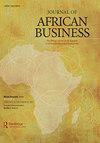如何启动非洲非正规创业革命?
IF 1.8
Q3 BUSINESS
引用次数: 6
摘要
商业可持续性的实现取决于创业生态系统(EE)和支持或挑战商业环境的机构之间的相互作用。鉴于非正规经济在发展中经济体中的重要性,我们需要重新思考如何启动一场非正规企业革命。本文从生态弹性的角度考察了非正式创业生态系统的关系。具体而言,本文分析了正规部门、非正规部门、节俭创新和产生无与伦比热情的支持性生态系统弹性之间的显著差异。从概念上讲,本文提出了生产性和非生产性情感表达的命题和模型,解释了非洲区域背景下的商业环境和相互作用的预测因素。可以说,随着创业教育和技能的增加,更有可能创建正式的企业和以增长为导向的微型、小型和中型企业(MSMEs)。这些都影响到经济增长,就非洲经济而言,影响到非正规经济向正规经济的转变。本文章由计算机程序翻译,如有差异,请以英文原文为准。
How to start African Informal entrepreneurial revolution?
ABSTRACT The achievement of business sustainability is dependent on the interacting components of the entrepreneurship ecosystem (EE) and institutions that support or challenge the business environment. Given the importance of the informal economy in developing economies, we need to rethink how to start an informal entrepreneurial revolution. This article examines the nexus of the informal entrepreneurial ecosystem, from the perspective of ecological resilience. Specifically, the article analyzes the significant differences between the formal sector, the informal sector, frugal innovations, and the supportive ecosystem resilience that produces unparalleled enthusiasm. Conceptually, this article developed propositions and a model of Productive and Unproductive EE explaining the business environment and the interacting predictors from the African regional context. Arguably, as entrepreneurial education and skills increases, there is more likelihood of the creation of formal ventures and growth-oriented micro, small and medium enterprises (MSMEs). These have implications for economic growth and – in the case of African economies – moving the informal to formal economy.
求助全文
通过发布文献求助,成功后即可免费获取论文全文。
去求助
来源期刊

Journal of African Business
BUSINESS-
CiteScore
4.60
自引率
10.50%
发文量
36
期刊介绍:
Journal of African Business is the official journal of the Academy of African Business and Development, the largest network of professionals committed to advancement of business development in African nations. JAB strives to comprehensively cover all business disciplines by publishing high quality analytical, conceptual, and empirical articles that demonstrate a substantial contribution to the broad domain of African business. Regardless of the research context, tradition, approach, or philosophy, manuscripts submitted to JAB must demonstrate that the topics investigated are important to the understanding of business practices and the advancement of business knowledge in or with Africa. Particularly, JAB welcomes qualitative and quantitative research papers. JAB is not, however, limited to African-based empirical studies. It searches for various contributions, including those based on countries outside Africa that address issues relevant to African business. Targeted toward academics, policymakers, consultants, and executives, JAB features the latest theoretical developments and cutting-edge research that challenge established beliefs and paradigms and offer alternative ways to cope with the endless change in the business world. Covered areas: Accounting; Agribusiness Management and Policy; Business Law; Economics and Development Policy; Entrepreneurship and Family Business; Finance; Global Business; Human Resource Management; Information and Communications Technology (ICT); Labor Relations; Marketing; Management Information Systems (MIS); Non-Profit Management; Operations and Supply Chain Management; Organizational Behavior and Theory; Organizational Development; Service Management; Small Business Management; Social Responsibility and Ethics; Strategic Management Policy; Technology and Innovation Management; Tourism and Hospitality Management; Transportation and Logistics
 求助内容:
求助内容: 应助结果提醒方式:
应助结果提醒方式:


